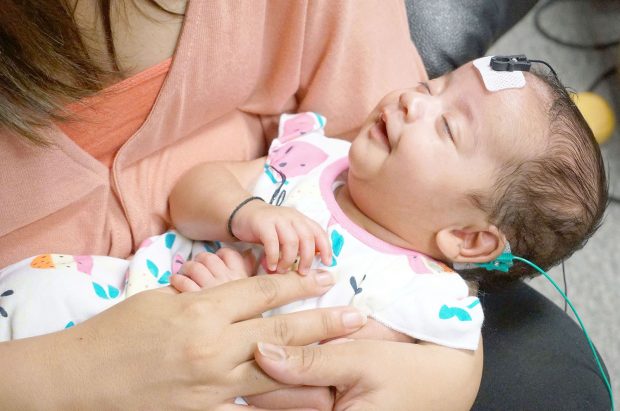
I am a screening and immunisation coordinator in the West Midlands. My portfolio covers several antenatal and newborn (ANNB) screening programmes. Along with colleagues, we review the quality and performance of local screening services.
I have a background in health visiting and am passionate about improving quality. I previously worked in a community newborn hearing screening programme (NHSP), so know how important it is to identify babies with hearing loss early and then provide the best care and support to improve outcomes and life chances.
Recently I undertook a project to understand why one provider's performance for Key performance indicator (KPI) NH2 was consistently below the acceptable standard of 90% of referred babies being seen in audiology within 4 weeks of their screening test.
Several reasons for missing target
Initially, we thought the target was being missed due to a health inequality where interpreters may not have been used to support non-English speaking mothers, meaning they may not have been aware of the importance of their baby’s audiology appointment.
However, on reviewing the audit data, we found that most women were English speaking and that interpreters were usually available where required.
Some strategies were in place to address performance but, on further investigation, we found that there were process and governance issues, particularly around the complex IT interface between the NHSP service and audiology department.
How we improved NH2 performance
To improve performance, the NHSP service and audiology department worked closely together to make positive changes to the process and governance issues.
The outcome has been significantly improved NH2 performance for the final 2 quarters of 2018 to 2019, reaching 98.1%.
Close working between the 2 departments has included discussing all exception reports that detail where the NH2 target is breached and an individual baby is not seen in the 4-week timeline.
Sarah Murphy, head of newborn hearing screening for Sandwell, Birmingham and Solihull, said:
It has been really good to work more closely with audiology to look at our processes and how they impact on each other. Working together to review the exception reports has particularly helped us to be more proactive and look for areas to improve. It is more rewarding for screeners knowing that the babies are being seen quickly.
The number of referrals has been reduced by monitoring individual screener performance and providing support and training as required.
The screening provider has improved attendance at audiology appointments by:
- ensuring they have the correct contact details for the parent
- providing the parent with an appointment letter at time of referral
- noting on the NHSP IT system if an interpreter is required
- alerting the baby’s health visitor (HV) that the baby needs a hearing follow-up by putting a sticker in the parent held record (the HV can then remind the parent of the need to attend)
- sending text messages to parents both a week and 24 hours before the appointment
Audiology reminds the families by phone the day before the appointment and makes sure language line is easily accessible in all locations.
Collaborative working supports continuous improvement
Collaborative working continues to impact positively on the referral process.
Audiology and NHSP meet to learn from case studies and discuss concerns.
The paediatric audiology lead:
- liaises with audiology administrative staff to make sure audiologists are aware of cancelled appointments and that rebooking is within required timescales
- checks the trust’s IT system, at least weekly, to make sure clinics are correctly populated and transferred across from NHSP
Audiology updates the NHSP national SMaRT4Hearing (S4H) IT system daily to check that assessments have been recorded. Sometimes, missing assessment information meant that data incorrectly showed that a baby had not been seen within 4 weeks.
Positive links have been made with health visiting teams. Audiology team members attend HV meetings to give programme updates and HVs receive a newsletter from the local NHSP service promoting the importance of audiology appointments.
Ellie Cadman is clinical lead in paediatric audiology at the University Hospitals Birmingham – Heartlands, Good Hope and Solihull Hospitals NHS Foundation Trust. She said:
We made audiologists aware of the difficulties we had identified in the processes so they could take responsibility and work closely with the admin team to improve timeliness of appointments. For the patient this has meant earlier identification of hearing loss, leading to improved outcomes for babies.
The regional report on this quality and performance review was circulated to all antenatal and newborn screening providers across the West Midlands to share the good practice. Our report also highlights the important learning in the recent national report on best performing NH2 sites.
Any other providers who may wish to adopt some of the above strategies can email Sue Griffiths for more information.
PHE Screening blogs
PHE Screening blogs provide up to date news from all NHS screening programmes. You can register to receive updates direct to your inbox, so there’s no need to keep checking for new blogs. If you have any questions about this blog article, or about population screening in England, please contact the PHE screening helpdesk.
1 comment
Comment by Irene Stratton posted on
Interesting to read how you've managed to identify and put right problems in your programme - and that what you thought might have been the reason turned out not to be. That's an important finding!
One small point - if you report a proportion as here:
"The outcome has been significantly improved NH2 performance for the final 2 quarters of 2018 to 2019, reaching 98.1%."
then it's important to include the numerator and the denominator.
(sorry - I'm a medical statistician)